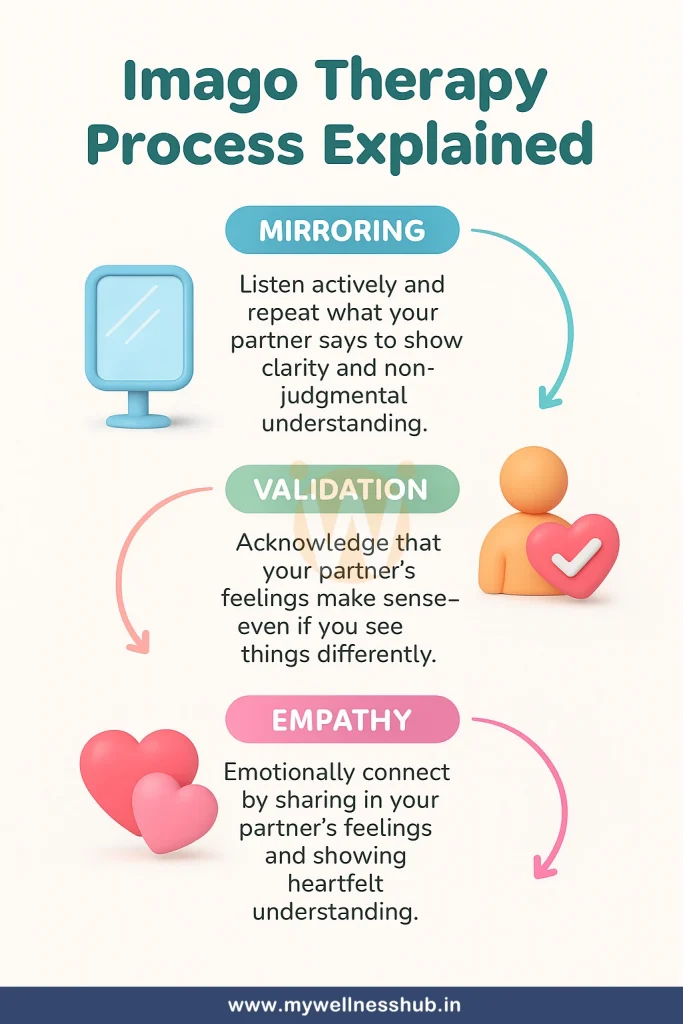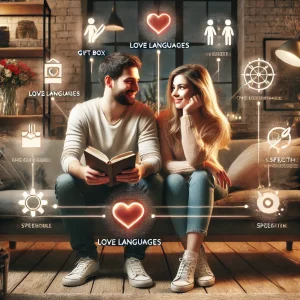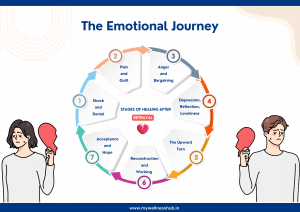The Basics of Imago Relationship Therapy: Key Things to Know
By Wellness Hub
Last Updated: May 20, 2024
Have you ever wondered if your relationship conflicts could lead to growth instead of just stress and frustration? Imago Relationship Therapy (IRT) offers a unique approach that does just that. Rooted in the belief that the challenges couples face are not merely obstacles to overcome but opportunities for deepening understanding and connection, IRT transforms how partners interact.
Developed in the late 1970s by Harville Hendrix and Helen LaKelly Hunt, Imago Relationship Therapy is designed to help couples move from blame and confrontation to understanding and empathy. Whether you’re trying to resolve long-standing disputes or strengthening your bond, understanding the basics of Imago Therapy could be your first step towards a healthier, more fulfilling relationship.
Also Read: Types of Marriage Counseling: A Simple Guide
Understanding Imago Relationship Therapy
Imago Relationship Therapy (IRT) is a transformative approach to relationships that emphasizes the power of connection and understanding between partners. But what exactly does “Imago” mean? The term comes from the Latin word for “image” and refers to an internal representation of love that each person develops during early childhood. This unconscious blueprint shapes our expectations of love and influences how we engage with our significant others as adults.
The psychological implications of this concept are profound. According to IRT, our imago is largely shaped by early interactions with primary caregivers. Whether those experiences were nurturing or lacking, they form a template we subconsciously seek to replicate in our romantic relationships. This search is not just about finding love but about healing and completing the unfinished business of our past.
Core Principles of Imago Therapy
Imago Relationship Therapy (IRT) is built on several foundational concepts that enhance understanding and connection between partners. At the core of these concepts is the understanding that our early childhood experiences significantly shape how we relate to our partners in adulthood.
The Role of Early Childhood Experiences
From the moment we are born, our relationships with our caregivers mold our expectations for love and connection. These formative years are crucial as they lay the groundwork for how we perceive and react to intimacy and conflict later in life. IRT posits that our positive and negative interactions during our early years create an internal blueprint, or ‘Imago.’
This Imago is a composite of all the traits and dynamics we experienced with our caregivers and significant adults. It includes the nurturing aspects we received and the needs that went unmet. As adults, we are often drawn to partners who reflect this complex image because, subconsciously, we are looking for someone who can help us heal the wounds of our past.
Also Read: 10 Powerful Couples Therapy Tips to Rekindle Your Love
Imago Therapy vs. Traditional Couples Therapy
| Aspect | Imago Therapy | Traditional Couples Therapy |
|---|---|---|
| Technique | Imago Dialogue involves a structured, step-by-step communication process where each partner mirrors, validates, and empathizes with the other to foster understanding and connection. | Open Discussion allows for more free-form dialogue where couples express their thoughts and feelings directly, with the therapist facilitating rather than structuring the conversation. |
| Focus | Focuses on fostering deep understanding and empathy by helping partners view each other’s perspectives through structured dialogue, emphasizing emotional connections and historical influences. | Centers on identifying specific problems and working towards solutions, focusing more on resolving immediate conflicts and improving practical interactions. |
| Outcome | Aims for deep emotional healing by addressing underlying emotional wounds from past relationships and family dynamics, thereby transforming the relationship at a foundational level. | Seeks to achieve conflict resolution with the goal of reducing or eliminating sources of tension, leading to a more harmonious relationship environment. |
Overview of the Imago: The Unconscious Image of Familiar Love
The term ‘Imago,’ derived from the Latin word for image, refers to this unconscious image we all carry—the image of our ideal mate, molded by our earliest experiences of being cared for and cared about. This image influences who we are attracted to and how we interact with our romantic partners.
Imago Therapy teaches that many conflicts in relationships arise because each partner is, in a sense, asking the other to fill the gaps left by their earliest love experiences. What we often see as shortcomings or frustrations in our partner may reflect our deepest needs and desires.
Techniques and Practices in Imago Therapy
Imago Relationship Therapy (IRT) offers various techniques to enhance communication and deepen emotional connections between partners. These practices are theoretical and practical tools that couples can use to foster understanding and growth in their relationships.

The Imago Dialogue: Mirroring, Validation, and Empathy
At the heart of Imago Therapy is the Imago Dialogue, a structured communication method that fosters safety, connectivity, and understanding. This dialogue is built on three key practices:
- Mirroring: This first step involves listening to your partner and repeating what you heard without judgment or interpretation. This does not mean parroting their words but rather reflecting the essence of their message. It’s about showing your partner that you truly hear and understand their perspective.
- Validation: Once you have mirrored your partner’s words, the next step is to validate their feelings. This doesn’t mean you have to agree with everything they say, but acknowledge that their feelings are valid and understandable within their context. This recognition can be profoundly affirming and is crucial to mutual respect and understanding.
- Empathy: The final component of the Imago Dialogue is empathy. This step moves beyond merely understanding your partner’s point of view to emotionally connecting with their experience. It involves expressing what you imagine your partner might be feeling, thus deepening the emotional bond between you.
Exercises and Workshops
In addition to the Imago Dialogue, Imago Therapy includes a variety of exercises and workshops designed to help couples practice these techniques and explore their relationship in a supportive environment. These can vary from simple exercises at home to more structured workshops led by trained therapists.
- Couples Exercises: These might include guided imagery exercises where partners visualize their future together, role-reversal exercises to see the world from the other’s perspective, or joint problem-solving tasks using Imago techniques to address real-life issues.
- Workshops: Imago workshops offer a more immersive experience. These are usually conducted over a weekend and are designed to help couples dive deeper into the Imago process. They provide a safe space for partners to explore their relationship dynamics, practice the Imago Dialogue, and connect with other couples on a similar journey.
Whether through private sessions, workshops, or personal practice at home, these Imago techniques provide a pathway to greater intimacy and understanding. By engaging in these practices, couples can transform their relationships into a source of strength and healing.
Benefits of Imago Relationship Therapy
Engaging in Imago Relationship Therapy (IRT) can be transformative for couples. This therapy offers specific advantages that improve the dynamics of a relationship and enhance personal growth and understanding. Here, we explore how IRT can lead to more profound communication, reduced conflict, and increased empathy between partners.
Improved Communication and Reduced Conflict
One of the primary benefits of Imago Therapy is its remarkable ability to improve communication between partners. By learning and applying the techniques of the Imago Dialogue—mirroring, validation, and empathy—couples find new ways to express their thoughts and feelings that foster understanding rather than conflict. This structured communication helps partners slow their interactions, ensuring each person feels heard and understood. As a result, many find that their day-to-day conflicts decrease in frequency and intensity because they’re equipped to handle disagreements more constructively.
Enhanced Understanding and Empathy Between Partners
Imago Therapy goes beyond teaching couples how to manage conflicts; it helps them see each other in a new light. By focusing on the deep-seated reasons behind a partner’s actions, which often stem from unmet childhood needs, each person can develop greater empathy and compassion for the other. This deeper understanding can transform how partners relate, turning typical arguments into opportunities for closeness and connection.
Moreover, this increased empathy has a ripple effect on the relationship. Partners approach conflicts and their shared lives with greater care and compassion. They become more attuned to each other’s needs and more supportive daily. This nurturing environment can lead to a more satisfying and resilient relationship.
A Tool for All Stages of a Relationship
Whether couples are in a crisis, navigating a relationship’s usual ups and downs, or even if they’re just beginning to consider deeper commitment, Imago Therapy can offer valuable insights and tools. It’s designed to solve immediate relationship issues and lay a foundation for long-term satisfaction and mutual growth.
Who Can Benefit from Imago Therapy?
Imago Relationship Therapy (IRT) is not just for couples in crisis; it offers benefits to a wide array of individuals and couples at various stages of their relationship. Whether navigating early relationship dynamics, deepening a long-term partnership, or seeking personal growth in how you relate to others, Imago Therapy can provide valuable insights and tools.
Couples at Different Stages of Their Relationship
- Newly Together: Imago Therapy helps new couples build a strong foundation for communication and understanding, leading to a healthier relationship.
- Long-Term Relationships: Imago Therapy can rekindle intimacy and address unresolved conflicts in long-standing relationships, rejuvenating the connection.
- Considering Commitment: Imago Therapy provides tools to align expectations and values for couples considering deeper commitments, ensuring both partners feel understood and valued.
- In Crisis: Imago Therapy offers a pathway to healing and rebuilding trust for couples facing significant challenges like infidelity or communication breakdowns.
Individuals Seeking to Improve Their Relational Patterns
Imago Therapy is also incredibly beneficial for individuals, not just couples. It helps single individuals understand their relational patterns, including their choice of partners and how they navigate relationships. This understanding is crucial for anyone looking to break cycles of unsatisfactory relationships or improve their approach to future partnerships.
- Single and Dating: Gain insights into how past relationships and early family dynamics shape your expectations and behaviors in romantic relationships.
- Personal Growth: Even if you’re not currently in a relationship, Imago can help you understand your needs, desires, and behaviors, empowering you to form more fulfilling connections in the future.
Imago Therapy teaches that our relationships mirror our deepest needs and wounds. By addressing these through the therapeutic process, anyone can achieve improved relationships and a greater sense of personal wholeness and fulfillment.
Limitations and Considerations
While Imago Relationship Therapy (IRT) offers many benefits, it’s important to recognize that it may not be suitable for all situations or couples. Understanding the limitations and considering whether IRT is the right approach is crucial before embarking on this therapeutic journey. Let’s discuss scenarios where Imago Therapy might not be the ideal solution.
Severe Relationship Crises
- Domestic Violence: Imago Therapy relies on safety and mutual respect. When domestic violence is present, safety is the top priority, requiring specialized interventions that Imago Therapy cannot provide.
- Substance Abuse: Active substance abuse issues must be addressed, often through specialized addiction treatment, before or alongside relationship therapy. Substance abuse distorts relationship dynamics and impairs emotional availability, making Imago Therapy’s empathetic communication difficult.
Other Considerations
- Severe Mental Health Issues: If one or both partners suffer from severe mental health disorders, such as major depression, bipolar disorder, or schizophrenia, these conditions might need to be stabilized with psychiatric treatment. While Imago Therapy can complement psychiatric care by improving relationship dynamics, it should not replace necessary medical or psychological treatment.
- Resistance to Structure: The structured nature of the Imago Dialogue and other exercises might not appeal to everyone. Some individuals may find these methods too rigid or prefer a more open-ended communication style. For the therapy to be effective, it’s important that both partners feel comfortable with its structure.
Personal Readiness and Commitment
The success of Imago Therapy also heavily depends on the willingness and readiness of both partners to engage in the process. If one partner is not fully committed, the therapy’s potential benefits may not be fully realized. This therapy requires openness to introspection, vulnerability, and a readiness to explore how past experiences influence current relationships.
Conclusion
Imago Relationship Therapy (IRT) improves your relationships by enhancing communication and understanding. Whether enhancing a good relationship or addressing issues, IRT provides tools like the Imago Dialogue to turn conflicts into growth opportunities.
To learn more or find a qualified therapist, visit the Therapy Options page on Wellness Hub. Taking the first step could strengthen and fulfill your relationships.
Frequently Asked Questions:
1. What is Imago Relationship Therapy?
Imago Relationship Therapy (IRT) is a therapeutic approach that helps couples and individuals improve their communication and relationships. It uses techniques like mirroring, validation, and empathy to help people understand each other better and transform conflicts into opportunities for growth.
2. How can Imago Therapy help improve a relationship?
Imago Therapy helps by improving communication, increasing empathy, and deepening the emotional connection between partners. It teaches partners to listen to each other effectively and respond in ways that foster understanding and closeness rather than conflict.
3. Who can benefit from Imago Relationship Therapy?
Imago Therapy benefits couples at any stage, whether facing challenges or wanting to strengthen their bond. It also helps individuals understand their relationship patterns and improve how they relate to others.
4. What should I expect during an Imago Therapy session?
During an Imago Therapy session, you can expect to engage in structured dialogues with your partner that focus on listening, understanding, and responding with empathy. These sessions typically last longer than usual therapy sessions to allow deep exploration of relationship issues.
5. Can Imago Therapy be used for individual counseling?
While Imago Therapy is primarily designed for couples, it can also be very effective in individual counseling. It helps individuals understand their relational patterns and how these patterns influence their current relationships.
6. Is Imago Therapy suitable for all couples?
Imago Therapy suits most couples but isn’t suitable for severe crises like domestic violence or ongoing substance abuse, which need specialized interventions.
7. How do I find a qualified Imago therapist?
You can find a qualified Imago therapist by visiting websites like Imago Relationships International, which offers directories of certified therapists. It’s also helpful to look for therapists who offer initial consultations to ensure they fit your specific needs well.
8. How long does it typically take to see results from Imago Relationship Therapy?
The timeline for results from Imago Therapy varies based on the issues and participants’ commitment. Many couples see improved communication and understanding within a few sessions.
9. What are the main techniques used in Imago Relationship Therapy?
The main techniques used in Imago Therapy include the Imago Dialogue, which consists of three parts: mirroring, validation, and empathy.
10. Can Imago Therapy help with personal issues that are not directly related to a romantic relationship?
Yes, Imago Therapy can also be beneficial for addressing personal issues. While primarily focused on improving relationship dynamics, the skills learned, such as effective communication and empathy, can be applied to personal growth and relationships with family, friends, and colleagues.
About the Author:
Prapoorna Mangalampalli
M.Sc., M.A., (Dual Masters in Psychology & English) – Counselor (6+ years of experience)
Prapoorna, with dual Master’s degrees in Psychology and English and over 6 years of experience, elevates human experiences through insightful counseling. She excels in online, marital, relationship, child, family, and career counseling. At Wellness Hub, she thrives in a team environment, valuing innovation, compassion, and client success. Connect with Prapoorna to find your voice and build a brighter future.
Book your Free Consultation Today
Parent/Caregiver Info:
Client’s Details:
* Error Message









